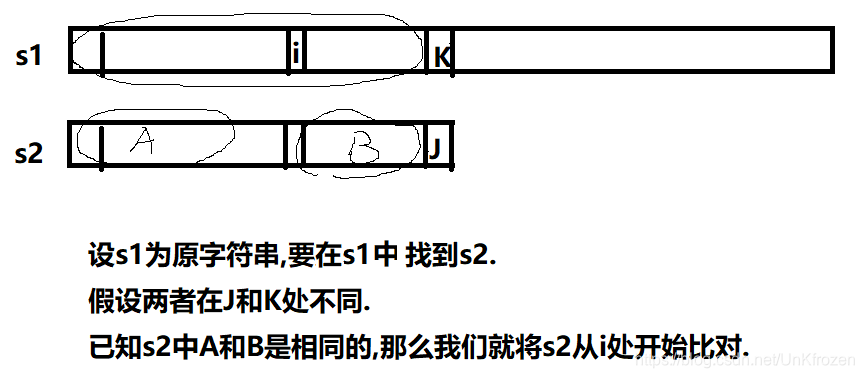蒟蒻学识浅陋,欢迎各位大牛指正
KMP从入门到放弃
请观左神为什么想要杀人%%%%njb7着重听1h12m20s
$KMP$分为两个部分,一部分为两个字符串间的比较,另一部分为自己与自己的比较.
简单的划分为下面两个图,详细理解请见左神不稳定情绪讲解.

不过我$jiao$的在$1:21:04$时,将例子换为$”ababcababak”$更好理解
代码
1 |
|
例题
G.Oulipo
HDU 1686
The French author Georges Perec (1936–1982) once wrote a book, La disparition, without the letter ‘e’. He was a member of the Oulipo group. A quote from the book:
Tout avait Pair normal, mais tout s’affirmait faux. Tout avait Fair normal, d’abord, puis surgissait l’inhumain, l’affolant. Il aurait voulu savoir où s’articulait l’association qui l’unissait au roman : stir son tapis, assaillant à tout instant son imagination, l’intuition d’un tabou, la vision d’un mal obscur, d’un quoi vacant, d’un non-dit : la vision, l’avision d’un oubli commandant tout, où s’abolissait la raison : tout avait l’air normal mais…
Perec would probably have scored high (or rather, low) in the following contest. People are asked to write a perhaps even meaningful text on some subject with as few occurrences of a given “word” as possible. Our task is to provide the jury with a program that counts these occurrences, in order to obtain a ranking of the competitors. These competitors often write very long texts with nonsense meaning; a sequence of $500000$ consecutive $’T’$s is not unusual. And they never use spaces.
So we want to quickly find out how often a word, i.e., a given string, occurs in a text. More formally: given the alphabet ${‘A’, ‘B’, ‘C’, …, ‘Z’}$ and two finite strings over that alphabet, a word $W$ and a text $T$, count the number of occurrences of $W$ in $T$. All the consecutive characters of $W$ must exactly match consecutive characters of $T$. Occurrences may overlap.
Input
The first line of the input file contains a single number: the number of test cases to follow. Each test case has the following format:
One line with the word W, a string over ${‘A’, ‘B’, ‘C’, …, ‘Z’}$, with $1 ≤ |W| ≤ 10000$ (here $|W|$ denotes the length of the string $W$).
One line with the text T, a string over ${‘A’, ‘B’, ‘C’, …, ‘Z’}$, with $|W| ≤ |T| ≤ 1000000$.
Output
For every test case in the input file, the output should contain a single number, on a single line: the number of occurrences of the word W in the text T.
Sample Input
3
$BAPC$
$BAPC$
$AZA$
$AZAZAZA$
$VERDI$
$AVERDXIVYERDIAN$
Sample Output
1
3
0
解析
$kmp$模板,读入不能用$cin$,否则超时
1 |
|